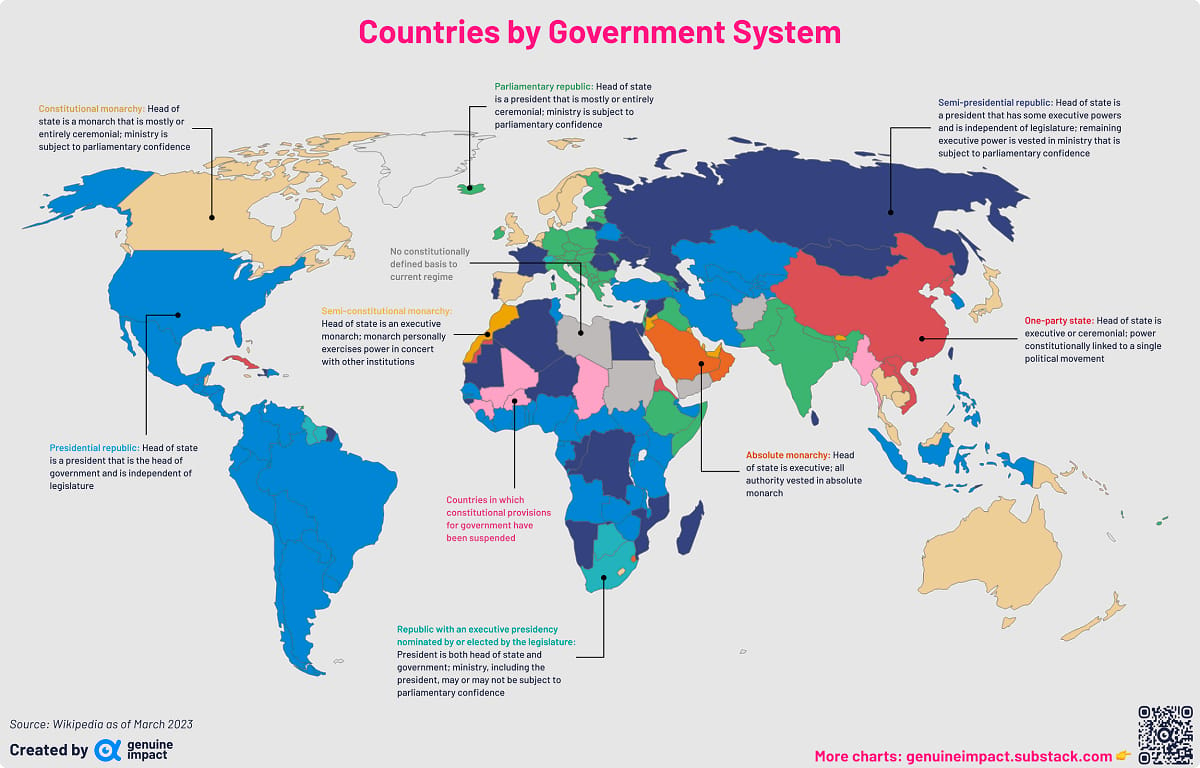
Good Morning. Welcome to all the new readers of Faster Than Normal who have joined us since last week!
Here’s what we’ll cover today:
Mental Model: The Change Paradox.
Insight: Weekly Reflection Practice.
Quote: Acknowledging Grief.
Question: Small Positive Impact.
Visual: Countries by Government System.
Cheers,
Alex
Hire remote employees with confidence

“We need a front-end developer by Tuesday, but it’ll take months to find someone in the U.S.”
Ever feel like that’s you? Well, we have you covered with some exciting news. We at Faster Than Normal just found the secret weapon for ambitious companies: the talent platform, Athyna.
From finance to creative, ops to engineering, Athyna has you covered. Oh, and did I mention they hire the best global talent so you’ll save up to 70-80% from hiring locally?
No search fees. No activation fees. Just incredible talent, matched with AI precision, at lightning speed. Don’t get left behind, hire with Athyna today.
| Mental Model
The Change Paradox
We want others to change, but we’re unwilling to change ourselves.
Forget it. We can’t change others, we can only change ourselves.
As the famous poet Rumi said, “Yesterday I was clever, so I wanted to change the world. Today I am wise, so I am changing myself.”
The "Change Paradox" illustrates that while we often desire change in others, we tend to resist changing ourselves. But the only person you have full control over is yourself.
Let's take a look at how this paradox can be practically integrated into core areas of your life:
1. Career: You might wish for a more understanding boss, or for colleagues who share your work ethic. But you can't force change on others. Instead, adapt your approach. If your boss isn't giving clear instructions, seek clarification proactively. If a coworker is not pulling their weight, have an open conversation about your team's shared responsibilities. Be the change you wish to see at your workplace.
2. Health: Maybe you wish that your family would adopt healthier eating habits. Instead of trying to force them, start by making healthier choices yourself. This could be as simple as adding more veggies to your meals, reducing processed food, or exercising regularly. By changing your habits, you may inspire your family to do the same.
3. Finances: You might wish for a more financially responsible partner. Instead of attempting to change them, lead by example. Create a budget, save regularly, and make informed decisions about spending. Discuss your financial goals with your partner, showing them the benefits of financial discipline.
4. Relationships: It's common to want others in our life to change their behaviors or attitudes. Instead, work on changing your responses. If a friend always shows up late, instead of growing resentful, communicate your feelings or arrange to meet them at a place where you can comfortably spend time waiting.
Remember Rumi's words - you have the wisdom to understand that change begins within. As you demonstrate the change you want to see, you might just inspire others to follow your lead. Change yourself first and watch how the world around you transforms.
| Insight
Regular reflection promotes personal growth.
Challenge: Schedule a weekly reflection session to assess your progress, learn from your experiences, and adjust your course as needed.
Example: Set aside 30 minutes every Sunday evening to review your accomplishments, setbacks, and lessons from the week.
| Quote
Julia Samuel, a psychotherapist and author, on the importance of acknowledging grief:
"Grief is the price we pay for love, and our capacity to grieve is as much a part of being human as our capacity to love."
| Question
In what ways can I create a positive impact on the world, no matter how small?
A Visual I Enjoyed

Credit: visualcapitalist.com
Have a wonderful Wednesday, all.
Until next time,
Alex
| P.S. — My Weekly Picks
Performance Psychologist Dr. Nate Zinsser on Building A Confident Mind (with Ryan Holiday) by Daily Stoic. Dr. Zinsser unpacks the subtle nuances between confidence and evidence, offering a fresh perspective on how to cultivate unwavering self-belief.
Thrive In A Complex World Using Science-based Tools by Clearer Thinking. A science-based resource for sharpening your cognitive toolkit.
19 Habits and Principles, All Based On Years Of Research, Writing, and Coaching by Brad Stulberg. True mastery is not achieved overnight; it's a gradual, intentional process that unfolds with each deliberate step..

